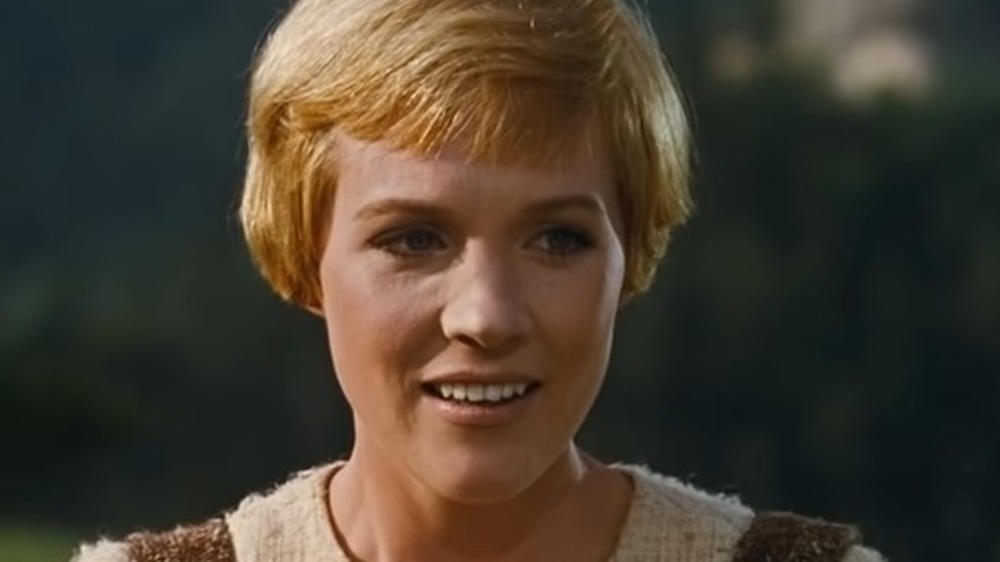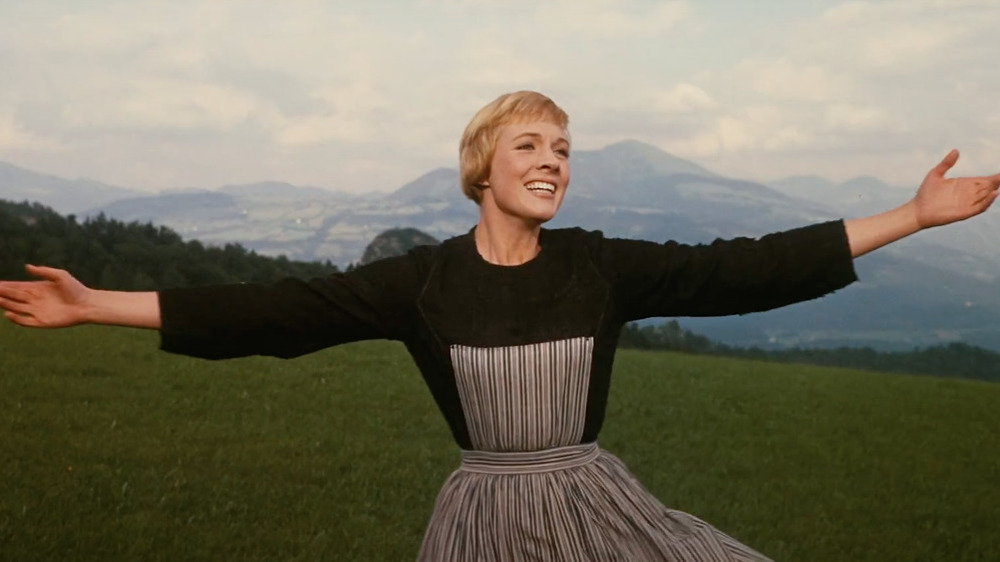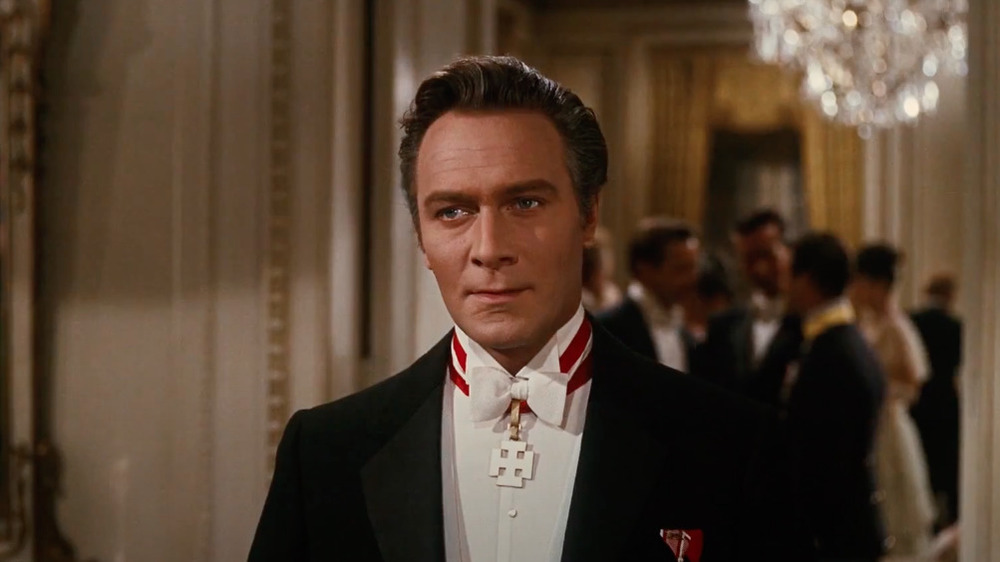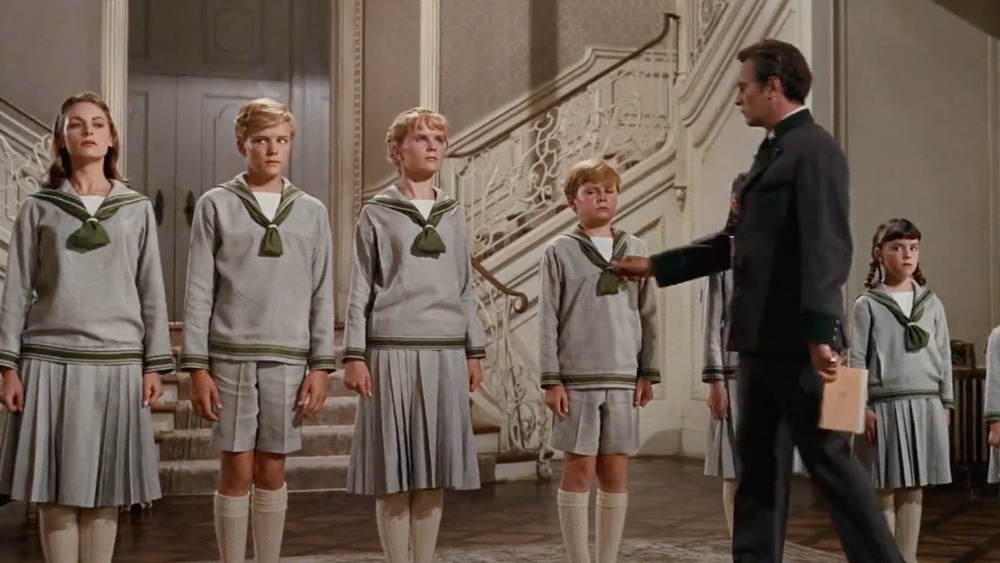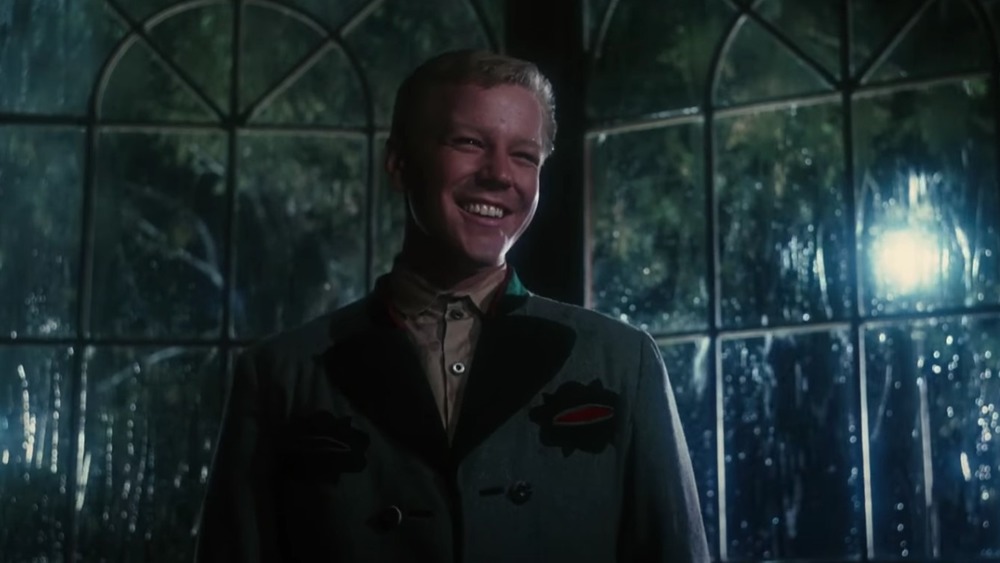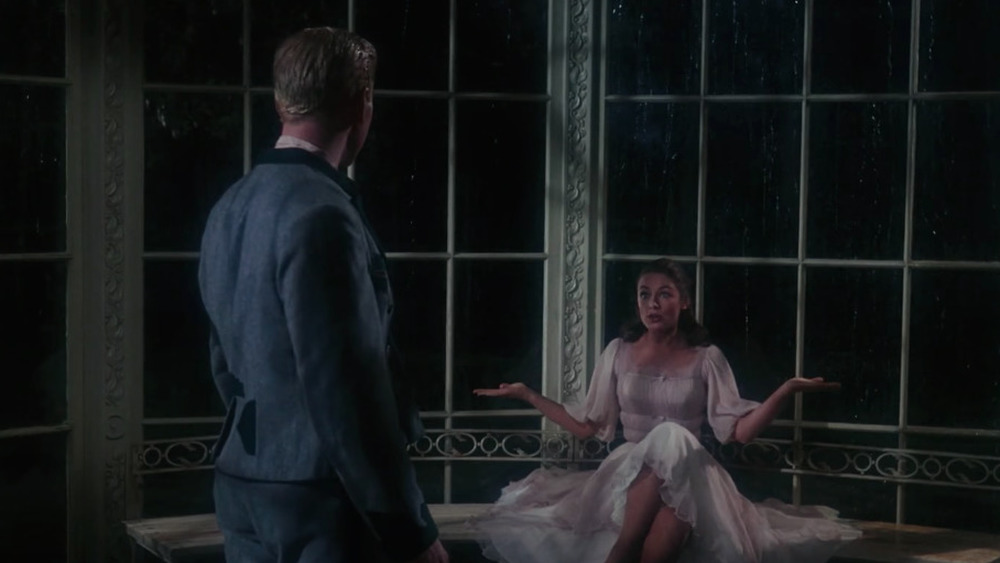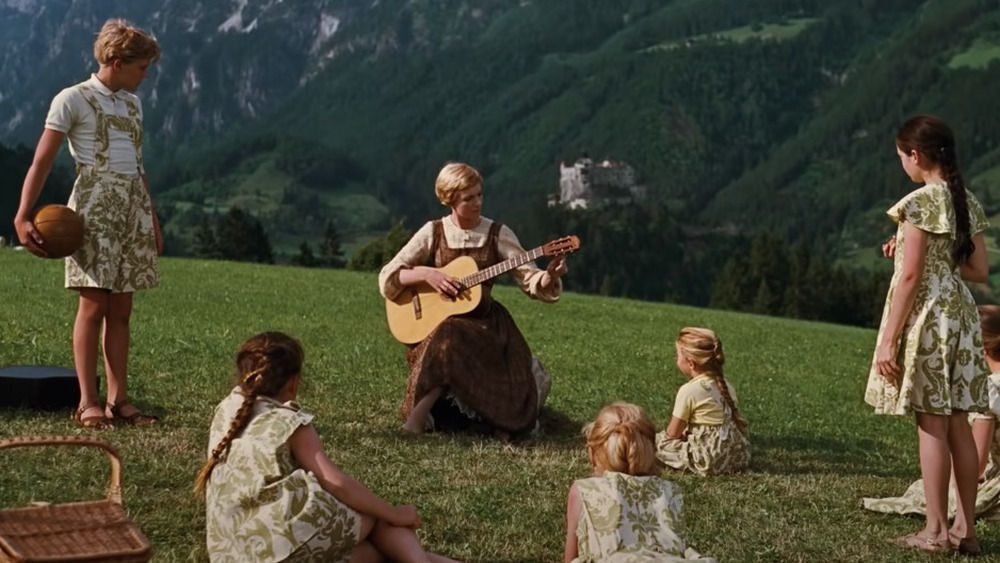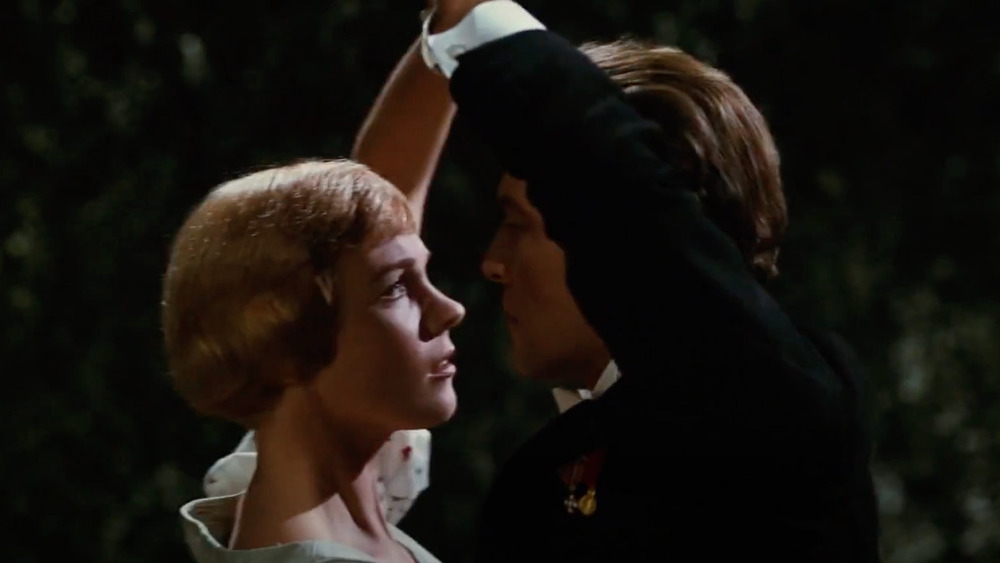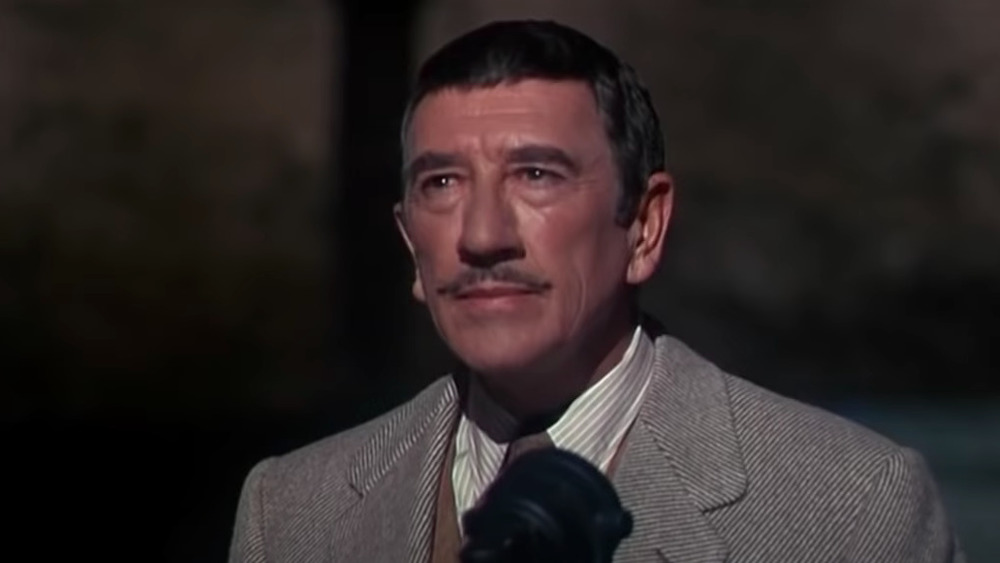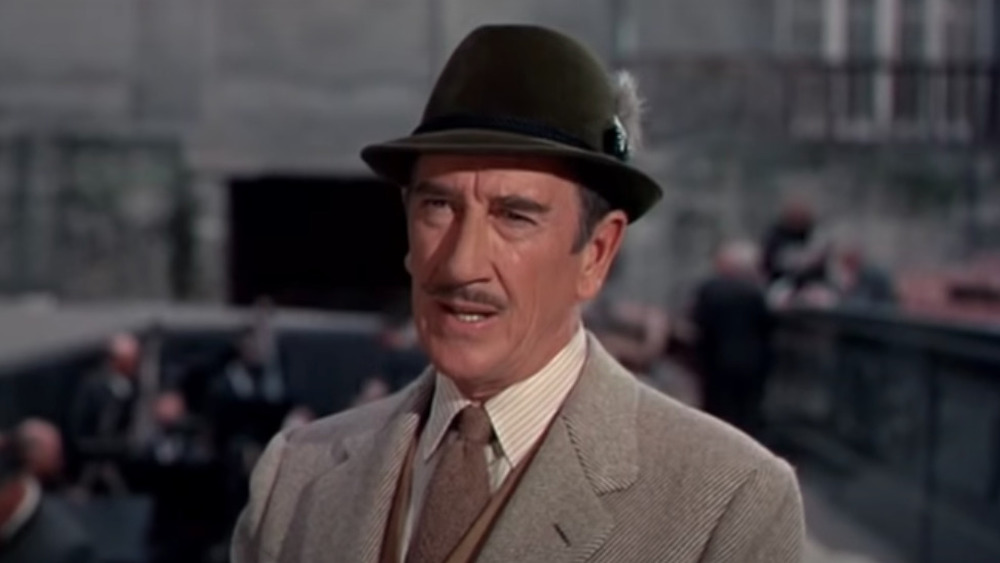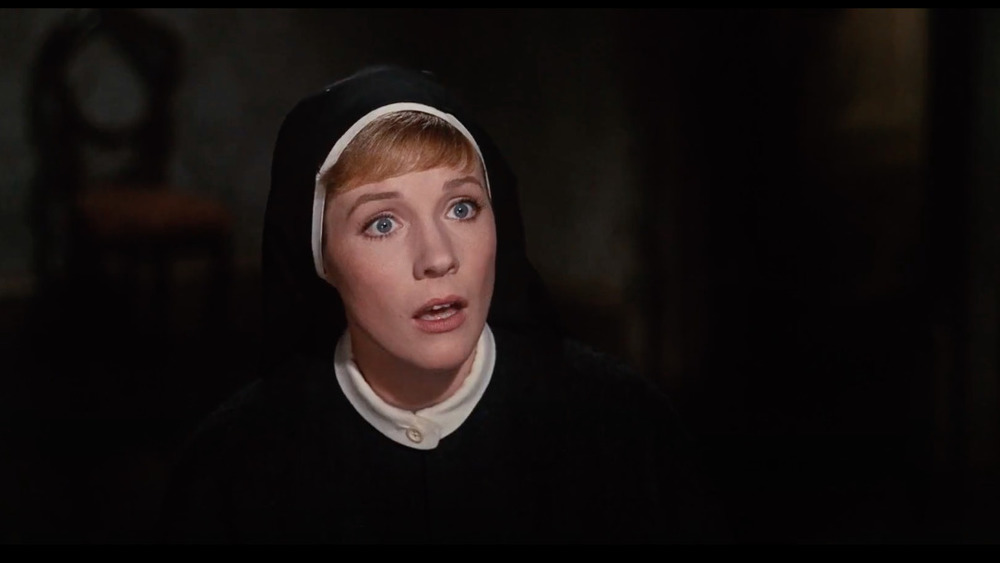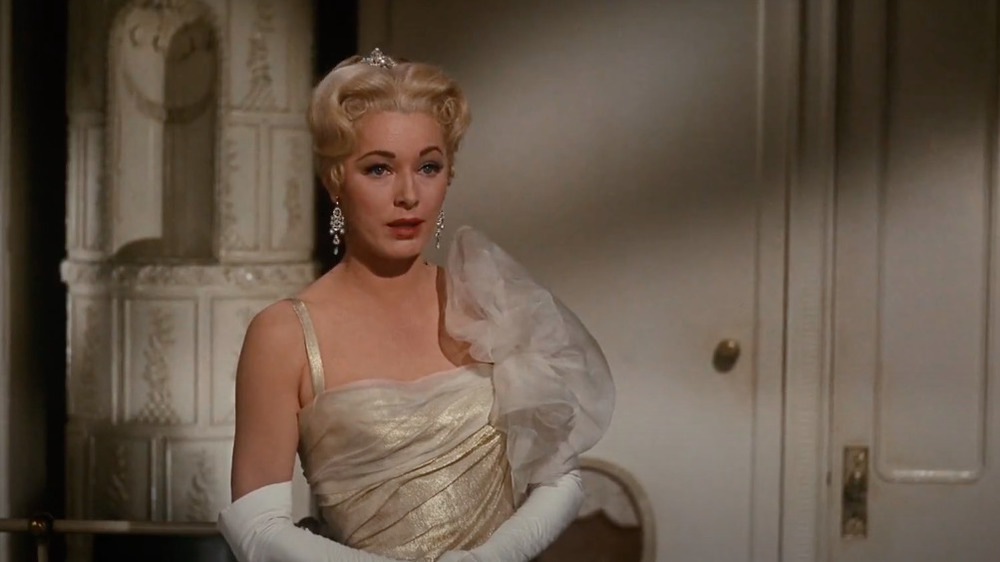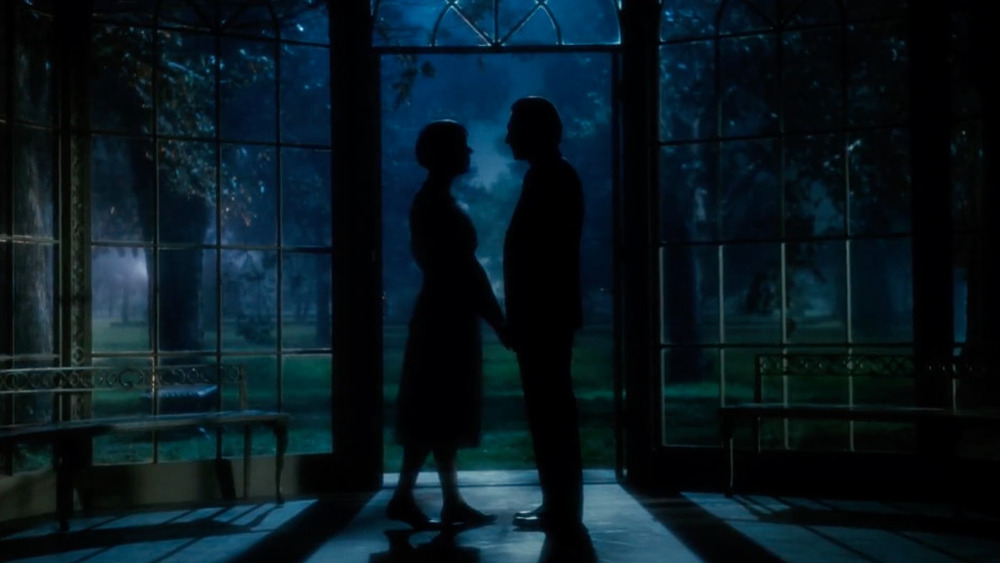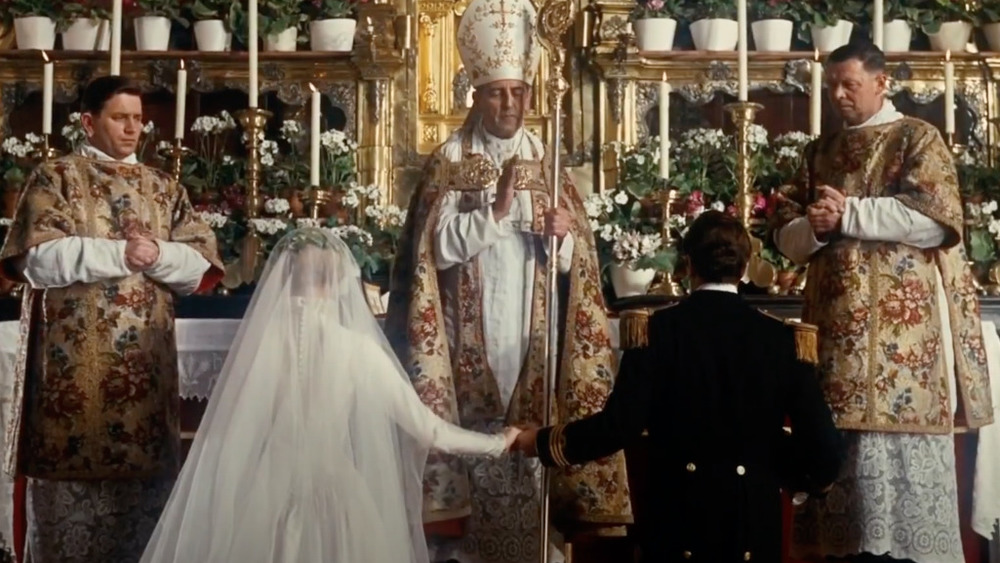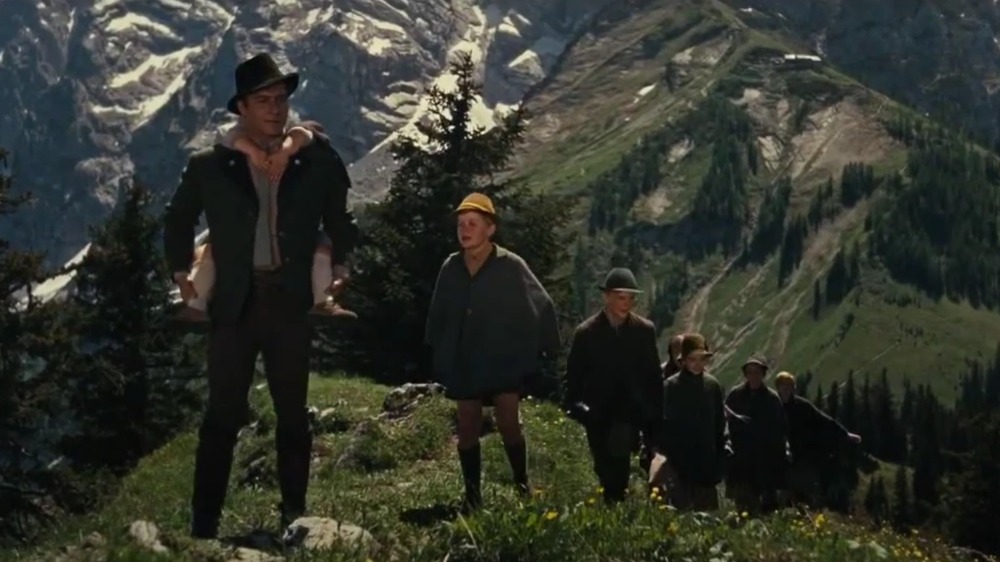The Sound Of Music: Moments Only Adults Seem To Catch In The Film
The Sound of Music is one of a few films that boasts enduring appeal and definitive icon status. The 1965 film version of the Rodgers and Hammerstein stage show, which was based on a true story, has gone down in history as one of the most popular movie musicals of all time. In fact, within one year of its release, it had already become the highest-grossing film of all time.
The tale of the young Austrian nun-to-be who is sent off to be the governess of a recently widowed naval captain's seven children is one most of us know by heart. Maria, the young, music-loving nun in question arrives at the stern Captain Von Trapp's mansion where she brings music and happiness back to the grieving family. She and the Captain fall in love, overcoming all kinds of odds, including a haughty baroness, their notable class difference, and, of course, the threat of the Nazis who have recently arrived in Austria. For a family movie, it deals with some surprisingly grown-up issues and themes. In fact, we rewatched the movie and were shocked by just how many things we missed as kids. It turns out, this film is filled with moments that only adults will fully understand.
The Sound of Music's opening shot is seriously impressive
The Sound of Music has one of the most iconic movie openings of all time. Whether you've seen the movie or not, you can probably visualize Julie Andrews launching into song with a spin atop the mountains of Salzburg.
As a kid, this moment was probably just a thrilling start to the movie. However, watching the film as an adult, you can't help but notice just how impressive the shot is from a practical perspective. It turns out, getting this legendary moment on camera was anything but easy.
As Andrews explained in an interview with the American Film Institute, "We had such terrible difficulties shooting that scene." Because we see the spin from above, the crew actually filmed the scene from a helicopter which flew at Andrews sideways with a cameraman "hanging where the door was supposed to be." The helicopter then turned around to repeat the shot. "The down draft from the jet engines as the helicopter went around me and the shot had been completed just leveled me every time," Andrews recalled. "I mean it flattened me to the ground it was so strong." Clearly making film history isn't easy!
Wait, Captain Von Trapp is pretty dreamy in The Sound of Music
When Maria arrives at the Von Trapp mansion, she is greeted by the stern, cold-as-ice Captain Von Trapp. For kids watching the movie, he seems like the ultimate scary dad; but for adults, the Captain comes across as more of a silver fox. As The Guardian noted at the film's 50th anniversary, Christopher Plummer's Captain is probably "the sexiest officer in naval history." And, as an Entertainment Weekly article about Plummer's performance noted, "It's not an accident that so many people cite Captain Von Trapp as their first crush. He's a hot dad of the highest order, and that's all Plummer's doing."
Even though Christopher Plummer himself had a somewhat difficult relationship with the character — he once called The Sound of Music "an albatross around my neck" (via New York Post) — it's clear that he suited this character perfectly. And older fans over the years have clearly noticed just how well he fills the Captain's naval uniform!
The parenting in this film is borderline abusive
Captain Von Trapp's parenting skills almost certainly look a whole lot worse to adult viewers than they may remember from their first watch. As a kid, watching the Captain treat his kids like members of a naval crew in The Sound of Music — barking orders at them, summoning them with a boatswain whistle, and forcing them to march around the house — had a bizarre sort of logic to it. He was a grieving widow after all. Maybe this was his way of coping with loss.
However, through more mature eyes, this parenting is nothing but inexcusable, regardless of his personal grief. And seeing the children's visible fear of their father at the beginning of the film adds a sad, even heartbreaking side to what was once "the silly marching scene."
As Anne McLeer of George Washington University pointed out in a 2002 NWSA Journal piece (via The Atlantic), the Captain's disciplinarian approach reflected a changing attitude towards gender roles. As McLeer pointed out, it was up to the nanny character help the father figure become softer and more domesticated with his children. "These changes [in character]," as she put it, "resonate with changing understandings of child rearing and family structure that had been emerging in postwar America."
Rolfe and the butler are bad news from the very beginning
As children watching The Sound of Music, most of us probably missed some of the ominous scenes at the beginning of the movie. In one scene, Rolfe, the postman and Liesl's secret boyfriend, exchanges a few words with the family's butler, Franz. As a kid, the moment comes across as a little dull. However, for adults, it's a sobering moment that foreshadows the political unrest to come. In the scene, Rolfe and Frank discuss "developments" and "movement," which, for older viewers, is a clear reference to the Nazi party.
In other words, he and the family butler are both pretty despicable characters right from the outset. In fact, reexamining this brief scene sheds some light on why Franz is seen watching the Nazis intercept the family later in the film when they try to escape the first time — chances are, he tipped them off! As kids, we probably didn't notice just how bad Rolfe really was from the very beginning. As one viewer pointed out in NPR, "Rolfe is presented as a romantic hero," rather than as the bad guy, so it's no wonder we never really noticed it before!
Have you ever really thought about the lyrics to "Sixteen Going On Seventeen" before?
For children, the Sound of Music song "Sixteen Going On Seventeen" probably seems very grownup. After all, the idea of being a 16-year-old with a 17-year-old boyfriend probably seems a million miles away when you're a child. However, for adults, the song takes on a more sinister note. The song actually reveals the layers of oppression that young women faced at the time. In fact, throughout the song, Rolfe repeatedly explains how he intends to take control of her sexual awakening — the whole "you need someone older and wiser" line of thought is definitely a little uncomfortable!
Of course, as adults, we also see the irony in the song. As The Guardian put it, "The lyrical irony of 'Sixteen Going On Seventeen' never fails to make me chuckle: Rolfe, an 18-year-old boy who's gullible enough to join the Nazis, tells his near-age mate, Liesl, that she's a naïve 'little girl' who needs someone 'older and wiser' telling her what to do." Whether you find the song uncomfortable or ironic, we definitely view this scene in a whole new light as adults.
Those curtain clothes are a pretty impressive feat for one woman to make
One of the most famous parts of The Sound of Music has to be the set of matching outfits that Maria makes out of her old curtains. The clothes serve as "play clothes" for the children to wear as they gallivant around Salzburg learning to sing while the Captain is away.
For kids watching the movie, the curtain clothes serve merely as a visual indication of the kids' transformation into more fun-loving, easy-going kids. However, adults watching the scene almost certainly think of the sheer amount of work that would have gone into the clothes. After all, Maria makes seven unique outfits by hand! This is one dedicated seamstress!
Naturally, the curtain clothes became iconic after the movie. As the Daily Mail reported in 2013, the outfits were so iconic that they were expected to sell at an auction for over $1 million!
It's surprisingly sexy when Maria and Captain Von Trapp dance in The Sound of Music
We've already mentioned that the late Christopher Plummer is something of a hunk in this movie — and when the romance between him and Julie Andrews really starts to get going, adult viewers certainly notice it. One of the key moments of sexual tension comes at the Von Trapp party when Maria and Captain Von Trapp dance together in the courtyard. For kids, the scene was probably just a little boring. However, for adults, the scene sizzles.
As one fan noted in an article for Decider, "'The Laendler' is one of the most snooze-inducing parts of The Sound of Music for a small child, but that's because it's totally not for kids. It's for the parents who know that dance was once one of the few ways men and women could touch in public." As this fan went on to say, "The subtext is loud and clear if you're a hot-blooded adult."
This particular Uncle Max moment is pretty problematic
The more we see of Uncle Max in The Sound of Music, the more we realize that his character is a little problematic. For kids, he comes across merely as the friendly uncle who helps the kids fulfil their dreams of singing onstage. For adults, Max's morals are thrown into question.
Max is portrayed as being extremely self-interested, which becomes problematic when it comes to his approach to the threat of the Nazis in Austria. In one scene, Max flippantly says, "What's going to happen is going to happen, just make sure it doesn't happen to you," to which Captain Von Trapp angrily replies, "Max, don't you ever say that again." As an adult, this moment jumps out. It's clear that Max is the type of person to avoid standing up for his beliefs in favor of self-preservation — even when it comes to Nazi Germany.
Max's laissez-faire attitude towards politics can be quite hard to watch in a modern context when speaking up about your beliefs is arguably more important than ever. Max illustrates the problem of being a bystander — and for adults, it can be difficult to stomach.
Is The Sound of Music's Uncle Max gay?
The morals that surround Uncle Max in The Sound of Music are one thing. However, there is another aspect of his character that we may have missed as kids. Rewatching the film as an adult, it's hard to ignore that Max exhibits quite a few stereotypes of a gay man.
As one fan wrote in The Guardian, "Speaking of progressive identities, the unmarried and insouciant Uncle Max, who arranges for the family to compete at the Salzburg singing festival, is clearly gay." Another viewer of the film also noted the less-than-veiled hints at Max's sexuality, writing for Kveller, "It wasn't until I was an adult that I realized two things about uncle Max. Uncle Max was Jewish, and Uncle Max was gay."
It's an interesting point — and definitely one that complicates things for this character considering the political era he lives in.
When Maria returns to the abbey, her real problem is not what we thought
After the party where Maria and Captain Von Trapp share their steamy Austrian folk dance, the Baroness convinces Maria to run away. Maria returns to the abbey where the Mother Abbess helps her to realize that her future lies outside of the abbey walls. For kids, the scene is pretty straightforward. Maria has to go back to the Von Trapp family to "climb every mountain" and follow her dreams and her heart. However, for older viewers, the scene is laced with more adult undertones.
As NPR noted, Maria's decision in The Sound of Music isn't just about love — it's also about chastity. As NPR put it, "No one wishes to say entirely explicitly, 'Celibacy is not for everyone. Just ask Liesl.'" As adults, we definitely see Maria's struggle in a new way — after all, her life as a nun would be very different, especially when it comes to the question of celibacy!
Baroness Schraeder isn't the wicked stepmother we remember
For children watching The Sound of Music, Captain Von Trapp's fiancée, Baroness Schraeder, comes across as the ultimate villain. Not only does she manipulate Maria into leaving the house, but she also threatens to ship the kids off to boarding school once she's tied the knot with the Captain!
But for adult viewers, the Baroness comes across in a brand new light. As Flood pointed out, she's actually pretty cool. She is glamorous and stylish, and she's also incredibly mature. When she finally realized that her fiancée is in love with Maria, she "takes the classy route." In her understated, shockingly grownup breakup with the Captain, she even tries to make him feel better, saying, "I really don't think you're the right man for me. You're much too independent. And I need someone who needs me desperately... or at least needs my money desperately." We never realized it till now, but the Baroness is actually a pretty wonderful example of an independent, strong woman who refuses to settle with a man who won't give her everything she deserves.
When Maria and the Captain confess their feelings, they reveal some hidden sexual entendres
For adult viewers, the Maria-Captain love story is pretty hard to ignore throughout The Sound of Music. But when the couple finally confess their feelings, even adult viewers may not notice a few hilarious sexual double entendres in the film. In the romantic scene, the Captain tells Maria that he first fell for her when she "sat on that ridiculous pinecone." Maria replies that she started loving him when he "blew that silly whistle."
As one writer explained in an article for Decider, kids usually think nothing of this exchange. In fact, they probably think it's pretty stupid. As the wrier put it, "She sat on a pinecone! He blew something! What's romantic about that?" However, for adults, the double entendres are all too clear. This definitely makes us watch the pair's first few scenes together in a whole new light!
The wedding in The Sound of Music is overshadowed by an ominous historical event
The wedding scene in The Sound of Music is pretty spectacular. With the gigantic cathedral, Maria's stylish gown, and the chiming bells, the scene initially seems to be nothing but the climax of the movie's romantic subplot. However, when you watch the movie as an adult, the ominous undertones of the scene become all too clear. As Maria and the Captain kneel in front of the altar, the camera pans up towards the top of the cathedral for a startling transition.
As Raymond Knapp wrote in the journal American Music, "As the wedding concludes, an eerie application of associational montage merges the celebratory wedding bells directly into the deeper bells celebrating the Anschluss, the 'peaceful' annexation of Austria by Germany." For kids watching the movie, the sight of soldiers marching through the streets is a little unsettling — but for adults, it's far more jarring.
Walking from Salzburg to Switzerland would take a long time
In the final scene of The Sound of Music, we are taken back to the hilltops of Austria as the Von Trapp family hikes their way across the border to the safety of Switzerland. The bird's eye view of the family fleeing Nazi-controlled Austria has become an iconic image, and it's definitely a fitting way to end the film. However, for adult viewers, it does raise a few questions. Namely, how does the family plan to get from Austria to Switzerland on foot?
It turns out, the hike would probably have been impossible. In fact, the real Von Trapp family who provided the inspiration for the film did not escape on foot — nor could they have. As one travel website, Rick Steves' Europe, explained, the border is actually a five-hour drive from Salzburg. In the real story, the Von Trapps boarded a train to Italy. As the real Maria Von Trapp once shared, according to the National Archives, "We did not climb over mountains with all our heavy suitcases and instruments. We left by train, pretending nothing." That's definitely more realistic!
